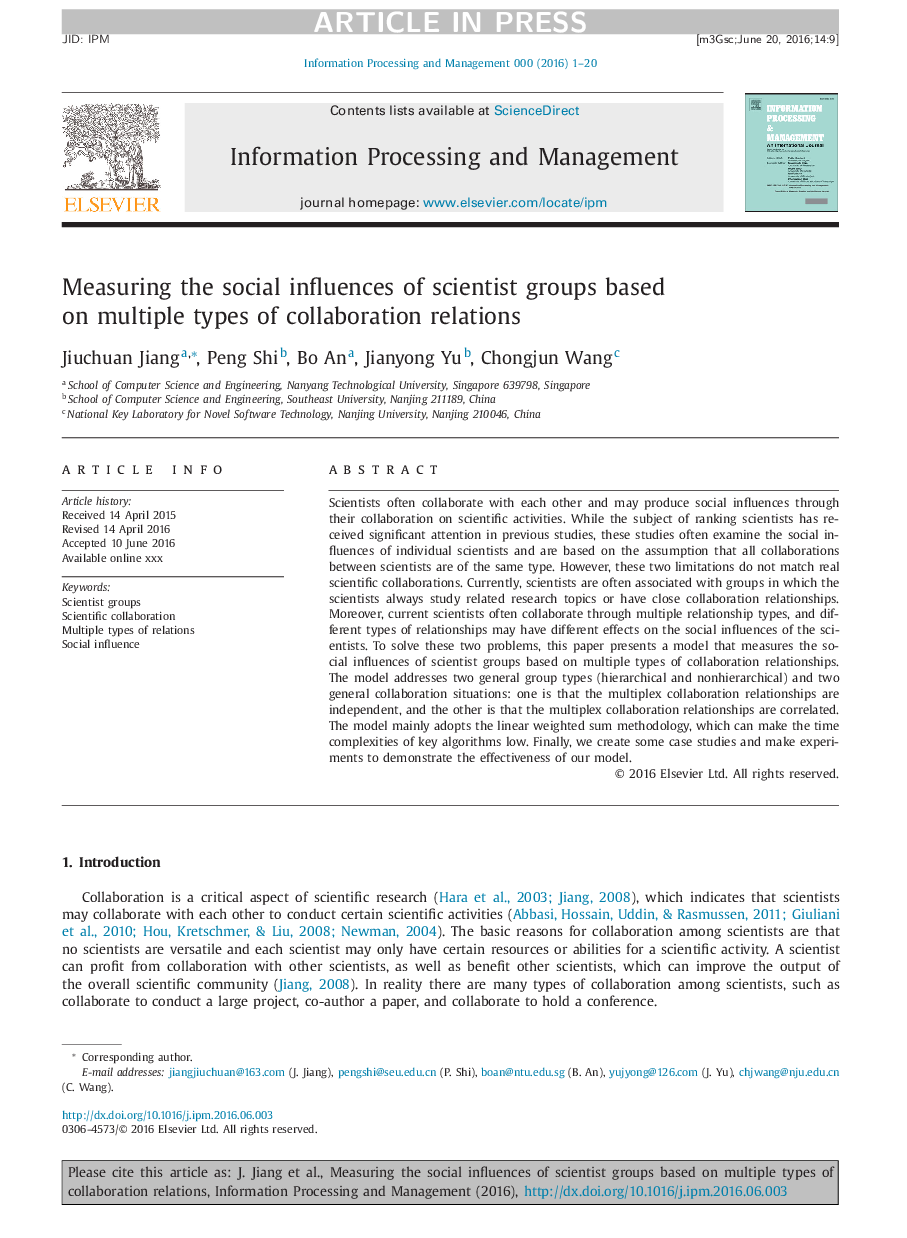| کد مقاله | کد نشریه | سال انتشار | مقاله انگلیسی | نسخه تمام متن |
|---|---|---|---|---|
| 4966498 | 1365125 | 2017 | 20 صفحه PDF | دانلود رایگان |
عنوان انگلیسی مقاله ISI
Measuring the social influences of scientist groups based on multiple types of collaboration relations
ترجمه فارسی عنوان
اندازه گیری تأثیرات اجتماعی گروههای دانشمند بر اساس انواع مختلف روابط همکاری
دانلود مقاله + سفارش ترجمه
دانلود مقاله ISI انگلیسی
رایگان برای ایرانیان
کلمات کلیدی
گروههای دانشمند، همکاری علمی، انواع مختلف روابط، نفوذ اجتماعی،
ترجمه چکیده
دانشمندان اغلب با یکدیگر همکاری می کنند و از طریق همکاری های خود در فعالیت های علمی می توانند تأثیرات اجتماعی ایجاد کنند. در حالی که موضوع دانشمند رتبهبندی در مطالعات قبلی اهمیت زیادی یافته است، این مطالعات اغلب تاثیرات اجتماعی دانشمندان فردی را بررسی می کند و بر این فرض است که تمام همکاری های بین دانشمندان از همان نوع هستند. با این حال، این دو محدودیت با همکاری های واقعی علمی مطابقت ندارد. در حال حاضر، دانشمندان اغلب با گروه هایی که دانشمندان همیشه موضوعات مرتبط تحقیقاتی مرتبط را تشکیل می دهند یا روابط همکاری نزدیک دارند، مرتبط هستند. علاوه بر این، دانشمندان کنونی اغلب از طریق چندین نوع ارتباط همکاری می کنند و انواع مختلف روابط ممکن است تأثیرات متفاوتی بر تأثیرات اجتماعی دانشمندان داشته باشند. برای حل این دو مسئله، این مقاله مدلی را ارائه می دهد که تأثیرات اجتماعی گروه های دانشمند را بر اساس چندین نوع روابط همکاری بررسی می کند. این مدل به دو نوع گروه کلی (سلسله مراتبی و غیر سلسله مراتبی) و دو وضعیت همکاری مشترک اشاره می کند: یکی این است که روابط همکاری چندگانه مستقل است، و دیگری این است که روابط همکاری چندگانه همبستگی دارند. این مدل عمدتا روش متداول وزن جابجایی خطی را می پذیرد که می تواند پیچیدگی های زمان های الگوریتم های کلیدی را کم کند. در نهایت، ما برخی از مطالعات موردی را ایجاد می کنیم و آزمایش هایی را برای اثربخشی مدل ما انجام می دهیم.
موضوعات مرتبط
مهندسی و علوم پایه
مهندسی کامپیوتر
نرم افزارهای علوم کامپیوتر
چکیده انگلیسی
Scientists often collaborate with each other and may produce social influences through their collaboration on scientific activities. While the subject of ranking scientists has received significant attention in previous studies, these studies often examine the social influences of individual scientists and are based on the assumption that all collaborations between scientists are of the same type. However, these two limitations do not match real scientific collaborations. Currently, scientists are often associated with groups in which the scientists always study related research topics or have close collaboration relationships. Moreover, current scientists often collaborate through multiple relationship types, and different types of relationships may have different effects on the social influences of the scientists. To solve these two problems, this paper presents a model that measures the social influences of scientist groups based on multiple types of collaboration relationships. The model addresses two general group types (hierarchical and nonhierarchical) and two general collaboration situations: one is that the multiplex collaboration relationships are independent, and the other is that the multiplex collaboration relationships are correlated. The model mainly adopts the linear weighted sum methodology, which can make the time complexities of key algorithms low. Finally, we create some case studies and make experiments to demonstrate the effectiveness of our model.
ناشر
Database: Elsevier - ScienceDirect (ساینس دایرکت)
Journal: Information Processing & Management - Volume 53, Issue 1, January 2017, Pages 1-20
Journal: Information Processing & Management - Volume 53, Issue 1, January 2017, Pages 1-20
نویسندگان
Jiuchuan Jiang, Peng Shi, Bo An, Jianyong Yu, Chongjun Wang,
